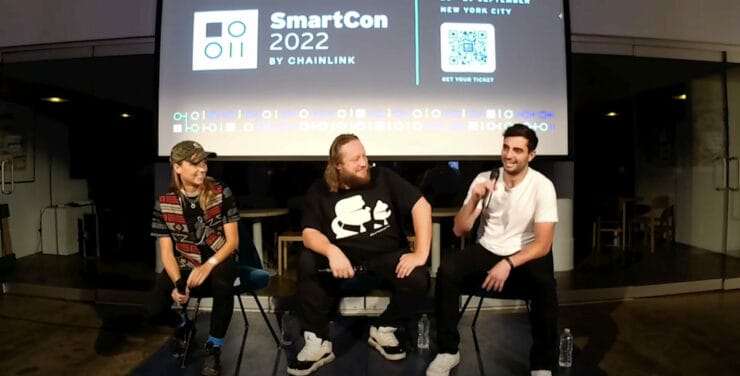At a recent Chainlink meetup in New York, Chainlink Labs’ Lauren Halstead hosted a panel discussion called “Beyond NFTs: Exploring Asset-Backed Collectibles” with BlockBar co-founder Samuel Falicand and Digible co-founder Serge Pustelnik. The conversation examined new use cases for “phygital” asset-backed collectibles that connect tangible luxuries with on-chain proof of authenticity.
BlockBar is a platform that allows luxury liquor brands to sell direct to consumers through asset-backed NFTs that can be burned to redeem the underlying asset or sold using Chainlink Price Feeds to convert ETH to USD. Digible is a marketplace for physical collectibles like rare trading cards that are backed by NFTs. The platform uses Chainlink VRF to digitally shuffle and distribute NFTs that are packaged together.
Both use cases illustrate how oracles enable NFTs with real-world utility. “Whenever you start telling people about NFTs, they look at you like you have three heads,” Falicand said. However, he believes NFTs can be utilized to solve problems for brands and consumers across industries.
“The NFT is just an efficient way to prove authenticity and ownership, so it really is just the bridge between digital and physical,” he explained.
Falicand said NFTs give brands the opportunity to directly interact with existing consumers and reach completely new demographics. And while prestige liquor brands initially wanted “nothing to do with NFTs,” Falicand said that conversation eventually started to shift. “Every company that we’ve done a release with has already signed up to do another release,” he said.
Falicand and Pustelnik agreed that their platforms are just two out of a vast landscape of phygital use cases, many of which have yet to be uncovered. Pustelnik alluded to phygitals’ near-universal appeal. “Everybody collects something,” he said.
“It’s cliche to say it’s still early, but it really is,” Falicand added. “The landscape is still being built out so I still think it’s still the beginning.”
Watch the full panel discussion.


